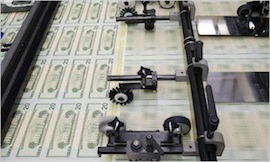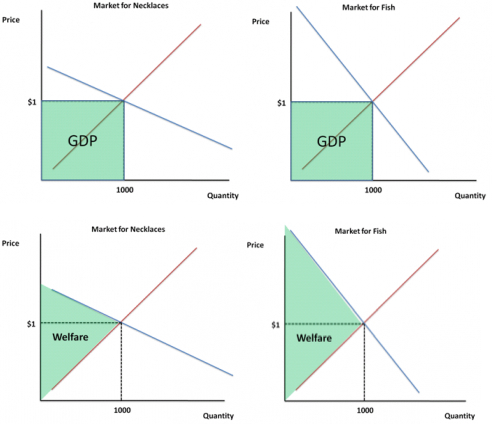Matthew Yglesias's Blog, page 2522
October 22, 2010
Citizens Against Government Waste Promotes Economic Ignorance, Anti-Chinese Demagoguery
On Monday I said I was surprised there was so much hue-and-cry over Jack Conway's campaign advertising when to my mind the ugly advertising story of this campaign is the endless parade of anti-Chinese demagoguery I've seen. The largest quantity of these ads seem to be from Democrats complaining about tax treatment of foreign corporate earnings, but the American right loves it some nationalism and has devised a whole range of its own China-bashing ads.
This one from Citizens Against Government Waste is both the best-produced and the most ridiculous:
There are a whole range of absurd things here. For starters, how likely is it that China's living standards will surpass America's by 2030? Well, if you assume China manages to grow faster in the future and achieve 10% per capita GDP growth every year for the next twenty years, and America experiences no per capita GDP growth whatsoever during this period, they'll end up slightly ahead of us.
But perhaps the Chinese haven't actually surpassed us. After all, though the touchpad device that one student is using looks pretty cool, its features are only very slightly more advanced than what's available in today's iPad. If you consider what counted as a state-of-the-art portable electronics wonder 20 years ago (back when we were paranoid about Japanese catch-up growth), the lack of progress being forecast for the Chinese middle class is actually pretty bleak.
Further as James Fallows says "if you know anything about the Chinese economy, the actual analytical content here is hilariously wrong."
The ad has the Chinese official saying that America collapsed because, in the midst of a recession, it relied on (a) government stimulus spending, (b) big changes in its health care systems, and (c) public intervention in major industries — all of which of course, have been crucial parts of China's (successful) anti-recession policy.
I actually think the message of this ad is something they could stand to hear in China where they really could use a bit more emphasis on market-driven consumer demand for products and a bit less central planning of megaprojects aimed at impressive foreigners.
Finally, it's worth noting that this portrayal of Chinese purchases of US government debt as part of some kind of long-term plot to enslave Americans is promoting a frightening level of ignorance as to what's happening. The policy of the Chinese government is, in effect, to tax Chinese consumers and use the revenue to provide subsidies to politically powerful exporters and their customers. This is bad policy and it violates WTO rules to boot. So the PRC has decided that it's discovered a loophole in WTO rules that allow it to in effect tax Chinese consumers to subsidize exporters and their foreign customers by buying US government debt to artificially boost the purchasing power of the dollar and artificially depress the purchasing power of the RMB. Rather than this being a reason for us to reduce borrowing it is, if anything, a reason for us to temporarily increase our borrowing in order to finance useful ventures since the Chinese government has committed itself to lending us the funds at sub-market rates.


Nominal Wage Cuts in the NBA
The best way out of a recession is a combination of expansionary fiscal and monetary policy to bolster aggregate demand. Failing that, you need to have a grinding process of nominal wage cuts and unbalanced deflation that can take years to end and cause massive human suffering in the meantime. David Stern wants the National Basketball Association to do its part to make the dream a reality:
Stern said the league wants player costs to drop $750 million to $800 million. Deputy commissioner Adam Silver said the NBA spends about $2.1 billion annually in player salaries and benefits. [...]
Stern and [Deputy Commission] Silver spoke after completing two days of meetings with league owners, who are seeking major changes to the current CBA that expires June 30. Silver said the league has told the union that owners are in a "diseconomic situation," with projected league-wide losses of about $340 million to $350 million this season.
Though season ticket sales are up, both insisted that no matter how well the league does at the box office, it won't change the fact that an overhaul is necessary to a system in which the players receive 57 percent of basketball-related income.
"Even though we reported we have record season ticket sales over the summer and otherwise very robust revenue generation, because of the built-in cost of the system, it's virtually impossible for us to move the needle in terms of our losses," Silver said.
This kind of pleading always strikes me as unpersuasive on the merits. If I owned a business that was losing tens of millions of dollars a year, I'd be eager to sell the business for a relatively small amount of money. When the Washington Post Company put Newsweek up for same, for example, they were ultimately willing to part with the firm for $1 on the condition that the new owner assume Newsweek's pension liabilities. Similarly, when General Motors and Chrysler were revealed to have an unsustainably high labor cost structure, nobody wanted to buy either firm at any price so the government had to step in.
By contrast, when Mikhail Prokhorov bought the New Jersey Nets—by no means the league's most lucrative franchise—he paid $200 million for the privilege. Ted Leonsis bought the Wizards, a terrible team, from the Pollard family for over $500 million this past summer. The high price of NBA franchises strongly suggests that operating one is valuable even with 57 of basketball-related revenue going to player salaries. Part of the issue is that the teams themselves can be in some ways loss-leaders for businesses whose real profit center is an arena or a cable network. Accounting can be misleading, actual asset prices are telling you something.


Temporary Monetary Stimulus Is Unlikely to Offer Many Benefits
I've read Joe Stiglitz's Q&A with Ezra Klein on quantitative easing thrice now and I can't quite decide if my view is that I agree with him or disagree. I suppose I just wouldn't put the points the way Stiglitz does. But I agree with this: "People recognize that this is a temporary intervention and the government won't maintain it for long, so they won't run to spend that money."
Temporary monetary interventions don't really do anything. Which I see less as a reason to oppose quantitative easing than as a reason to urge permanent intervention.
Paul Krugman wrote the best piece on this twelve years ago long before the current crisis arose:
Of course the Bank of Japan does not announce whether its changes in the monetary base are permanent or temporary. But we may argue that private actors view its actions as temporary, because they believe that the central bank is committed to price stability as a long-run goal. And that is why monetary policy is ineffective! Japan has been unable to get its economy moving precisely because the market regards the central bank as being responsible, and expects it to rein in the money supply if the price level starts to rise.
The way to make monetary policy effective, then, is for the central bank to credibly promise to be irresponsible – to make a persuasive case that it will permit inflation to occur, thereby producing the negative real interest rates the economy needs.
This sounds funny as well as perverse. Bear in mind, however, that the basic premise – that even a zero nominal interest rate is not enough to produce sufficient aggregate demand – is not hypothetical: it is a simple fact about Japan right now. Unless one can make a convincing case that structural reform or fiscal expansion will provide the necessary demand, the only way to expand the economy is to reduce the real interest rate; and the only way to do that is to create expectations of inflation.
That was right then and it's right today. And if it's deemed to be difficult, in practice, for a bunch of sober-minded central bankers to commit themselves to higher inflation then they need to throw a crackpot blogger onto the FOMC. Someone with a track record of urging drastic action and a more rapid increase in the inflation rate. Either that or they need to adopt a level-targeting doctrine. Either way, the point is that it's possible to get the job done but you have to face the problem squarely and not do the stop/start thing where you pull back from expansion the moment it seems to be working. As Stiglitz says, you can't really trick people like that.


October 21, 2010
Endgame
I know you won't listen to me:
— It's not possible to not have a monetary policy, the only question is which policy would be best.
— Rob Portman wants to create lots of moral hazard.
— What would Milton Friedman do?
— I want to see a Social Network remake where Sean Parker urges Mark Zuckerberg to move his company to South Dakota.
— Could Pelosi get the boot even if Democrats hold the House?
Sufjan Stevens, "Bad Communication" is good but also makes me nostalgic for Ill Communication.


UK Austerity Budget Highlights Nonideological Case For Filibuster Reform
I think the Cameron-Clegg austerity budgeting in the United Kingdom is excessive and very unlikely to work as macroeconomic stabilization policy. And I think it's clear that at least one reason they're going so far all-in in this direction is simply that the UK Tory Party is a right-of-center party that has an ideological aversion to government spending.
But I do hope that American conservatives will look at the UK and recognize that even though they may have enjoyed the filibuster in 2009-2010, the extremely cumbersome nature of the American political process will make it forever impossible to enact these kind of sweeping cuts in the United States.
From where I sit, the system they have in the UK where you can simply sweep opposition objections aside is actually the right way to do bipartisanship. Call it bipartisanship by alternation. When Labour wins the election, Labour has the chance to implement a bold agenda creating and expanding programs in a way that they think will make Britain a better place to live. Then when the Tories come in, they're able to be brutal in their efforts to pare back or eliminate things that they think aren't working. Over the long term, you get a trajectory where programs survive if and only if they're so widely regarded as successful that no mainstream party would dare abolish them. In the United States, it's hard to do anything but then once anything's been put in place it's almost impossible to scrap or alter it as long as any non-trivial constituency is willing to back it.
The net result, it seems to me, is government that's "smaller" than what you see in most other democracies but also much more focused on bad or poorly designed programs.


Anti-Anti-Racism
My friend Dave Weigel writes that Juan Williams "has instantly become a sort of icon for conservatives angry about media bias."
I think that's a pretty naïve read of what it is conservatives are angry about. What we're seeing is episode one million in the American conservative movement's passionate attachment to the cause of anti-anti-racism. Relatively few conservatives are interested in expressing racist views, but virtually all conservatives are united in the conviction that anti-racism run amok is ruining the country and almost no conservatives are interested in combatting racism. You normally see this in a black-white context, but increasingly over the past two years it's emerging in a Muslim-Christian context. The central conservative passion when it comes to these bias issues is the bizarre notion that it's hard for members of the majority group to get a fair shake and then unwarranted suppression of alleged anti-minority views is a much bigger problem that actual bias against minority groups.


The Consumer Surplus Era
Erica Sadun writes about developing aps for Apple's mobile devices:
As far as I can calculate, I have now shipped well over a million apps on App Store — that's extrapolating from the 600+ thousand copies that iTunes Connect tells me I've pushed out in the last six months, not including updates and such — just individual purchases. And no, I haven't earned much from those purchases because nearly everything I've put on App Store to date has been free.
That's not the point.
Being able to touch that many people's lives, and offer them a few nice utilities is the point. Even as a primarily free developer, it's brilliant to know that I can create apps that matter, that entertain, and that help. I love when people write me and say: "This app is fun" or "helpful" or "silly" or "delightful." And I wouldn't have been able to do that without App Store.
She says she's excited that there's going to be an "ap store" for Macs now, because like the ap store for Apple's mobiles it will greatly simplify the distribution of programs that she writes primarily because she wants people to use and enjoy them.
This seems like a good time to trot out Karl Smith's handy demonstration of the difference between a given sector's contribution to GDP and its sector to consumer welfare:
The gap between what a given sector contributes to measured GDP and what it contributes to human well-being has always been with us. But the ways in which digital technology makes the non-commercial production and dissemination of information goods viable opens up vast new horizons of consumer welfare. Whether or not someone would enjoy manufacturing automobiles in his spare time as a hobby and distributing them to hundreds of thousands of people for free, it's not possible to do. The marginal cost of building a car is pretty high, distributing cars is difficult, and the start-up costs of building a car factory are enormous.
Producing information goods—software, text, music, etc.—and distributing it on the internet isn't like that at all.
Consequently, the realm of activities with gigantic divergence between measured GDP and welfare value is vastly expanding in ways that I don't think policymakers and civil society donors are yet responding to in fully appropriate ways. The case for finding ways to directly and indirectly subsidize the creation of such goods is extremely strong. But more generally, I think we should expect the significance of this kind of thing to expand in the future. After all, the most active and intense hobbyists are typically senior citizens who, thanks to being retired, have the time and inclination to indulge their passions and desire for recognition and community. But the current cohort of senior citizens in the developed world has very weak digital skills.


EZ-Pass Saves Lives
I firmly believe that future people are going to regard the level of traffic congestion tolerated by the people of the early 21st century as slightly bizarre. I only rarely drive, so it's not a big issue in my life, but perhaps that makes the persistence of this solvable problem more salient to me. At any rate, further evidence that it's a hugely underrated issue is provided by Janet Currie's paper "Traffic Congestion and Infant Health: Evidence from EZ Pass"
This paper provides evidence of the significant negative health externalities of traffic congestion. We exploit the introduction of electronic toll collection, or E-ZPass, which greatly reduced traffic congestion and emissions from motor vehicles in the vicinity of highway toll plazas. Specifically, we compare infants born to mothers living near toll plazas to infants born to mothers living near busy roadways but away from toll plazas with the idea that mothers living away from toll plazas did not experience significant reductions in local traffic congestion. We also examine differences in the health of infants born to the same mother, but who differ in terms of whether or not they were "exposed" to E-ZPass. We find that reductions in traffic congestion generated by E-ZPass reduced the incidence of prematurity and low birth weight among mothers within 2km of a toll plaza by 6.7-9.1% and 8.5-11.3% respectively, with larger effects for African-Americans, smokers, and those very close to toll plazas. There were no immediate changes in the characteristics of mothers or in housing prices in the vicinity of toll plazas that could explain these changes, and the results are robust to many changes in specification. The results suggest that traffic congestion is a significant contributor to poor health in affected infants. Estimates of the costs of traffic congestion should account for these important health externalities.
The small issue here is that public policy should more strongly encourage people to get EZ Pass. Indeed, I would say that the use of some form of electronic toll-paying system should probably be made mandatory and other options phased out. That's in part because universal use of EZ-Pass would make it much easier to tackle the large issue here which is that taking up space on a crowded road at a crowded time imposes large costs on other people. People should be charged for the right to do so, which could massively reduce traffic congestion with large economic and public health benefits.


Replacement-Level Punditry
Jon Chait disagrees with me about Juan Williams:
Matthew Ygelsias applauds the firing because Williams is a mediocre, "replacement-level" commentator. That strikes me as a total dodge. Most commentators — most members of every profession! — are average. The question here is whether we want to create an atmosphere where commentators need to live in fear that even contemporaneous comments will be scrutinized by the strictest standards of tolerance, and a one-strike-and-you're-out policy is generally applied toward their employment.
I didn't call Williams "average." Obviously being average can't be a firing offense. I accused him of "general lameness and lack of valuable contribution to their programming" and on Twitter accused him of offering "replacement-level political commentary." The latter was intended as a reference to baseball's VORP concept and means that Williams is well below average.
Which is just to say that I don't think I've dodged anything. Like Jon Chait I don't like the idea of hair-trigger firings of people who step in it while making on-the-fly comments. At the same time, I'm against non-interesting non-insightful political commentary. And I'm very much against the idea, all-too-prevalent today, that certain kinds of punditry perches should be treated like tenured professorships from which people can only be let go for some kind of egregious misconduct. So while I wish this series of events hadn't gone down in this way, I can hardly say I'll miss Williams once he's gone from NPR.


The Pricey Bailout
The flipside to the negative cost of the very controversial and much-loathed TARP bank bailout is that the bailout of Fannie Mae and Freddie Mac has already cost almost $150 billion and could cost $100 billion more before all is said and done.
The irony here is that though the passage of the Trouble Asset Relief Program was the subject of a gigantic high-profile controversy, absolutely nobody paid attention when Congress passed and President Bush signed the Housing and Economic Recovery Act of 2008 back in July 2008. The debate over the HERA didn't spill over into the presidential campaign, nobody ran any ads in the 2008 or 2010 cycles hitting anyone for voting in favor of HERA. And the vote wasn't even close. It passed the Senate by an 80-13 margin.
Since the election, there's been a ton of commentary from right-of-center people about the evils of Fannie and Freddie but at the time of the actual bailing-out there was little comment on the action. Bryan Caplan said it was a mistake and we should have just let them flop, but Greg Mankiw and Tyler Cowen disagreed.
Fundamentally, I think Fannie and Freddie as they existed pre-crisis represented a bad implementation of the bad idea that government policy should promote the construction of large single-family owner-occupied housing. But the concept of pro-suburbanization industrial policy seems very broadly supported in American politics.


Matthew Yglesias's Blog
- Matthew Yglesias's profile
- 72 followers











